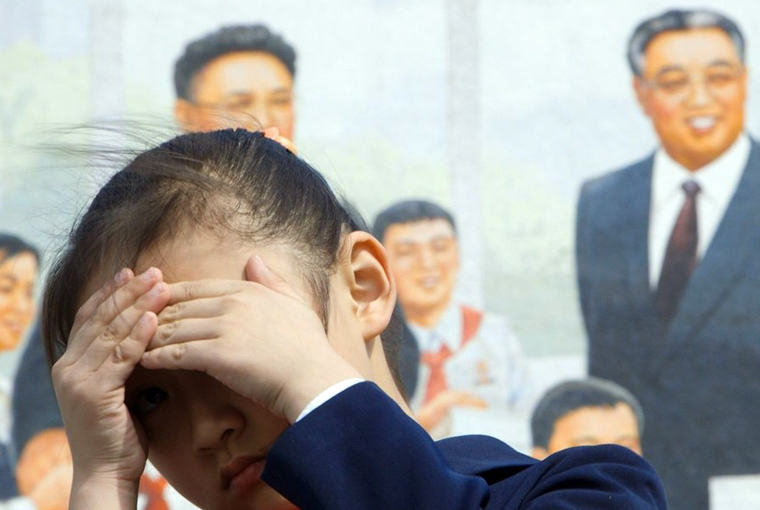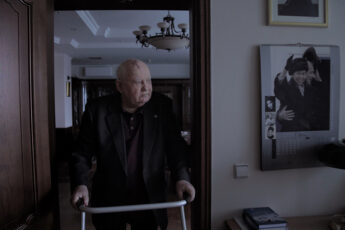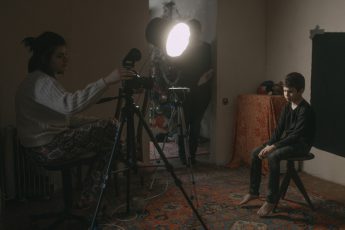Too Much in the Sun
Vitaly Mansky’s Under the Sun (V luchakh solnca, 2015)
Vol. 67 (September 2016) by Moritz Pfeifer
In Shakespeare’s Hamlet, the hero’s mother remarries his uncle Claudius after murdering his father in a vicious plot to seize the throne of Denmark. In one scene Claudius confronts his stepson, who has turned depressed, and asks him why the “clouds” are hanging on him. Hamlet cunningly rebuffs that he is “too much in the sun”, implying that he would have preferred to remain the “son” of his real father and a citizen under the “sun“ (sovereign power) of the true king of Denmark. Zin-mi, an eight-year old citizen of contemporary North Korea and main character in Vitaly Mansky’s latest documentary Under the Sun (2015), may also be too much in the sun. The brightest star in this exceptional work is Kim Jong-un who, although not the girl’s relative, exerts a similar effect of political sunburn and paternal usurpation on the young girl. Alas, Zin-mi is not mature enough to have rebellious witticisms readily available, with prospects for nonconformity more or less zero. She can only cover her eyes, when, during a school celebration for Kim Jong-il, the sun shines too brightly on her face. And yet the insignificant gesture almost comes across as an act of disobedience.
Every detail of Zin-mi’s life seems to be controlled by the Korean ruler’s vast state apparatus, including Mansky’s documentary. The director had the North Korean government as a production partner. High authorities whom he reportedly never met chose the characters and locations, had complete control over the script and the right to correct any mistakes during the production process. The everyday life of the little girl was supposed to showcase North Korea as a socialist paradise: a dinner scene turns into an advertisement for the health benefits of kimchi; in a history class the children learn about the endless bravery and sacrificial zeal of Kim Il-sung; a day at work for Zin-mi’s mother ends up as a celebration for her daughter joining the North Korean Children’s Union.
But Minsky somehow managed to keep the camera rolling before and after the official takes. The overwhelming power of the state is introduced gradually in these off moments, which turn the film into a scary and sometimes clumsily funny “making of” of state propaganda and personality cult. In the kimchi scene, for example, two apparatchiks in gray trench coats routinely enter the frame to give directional advice such as “laugh louder” or “pretend to be at home”, having the poor family repeat their lines ad nauseam. Little by little, everything turns out to be staged: the parents’ jobs, their home and eating habits; Zin-mi’s school, her extracurricular activities, and free time. Mansky never uses any voice-over to dramatize what is going on. Sometimes he adds explanatory texts that clarify what seems to be the most likely reality of Zin-mi’s family were it not for them playing a part in a promotional film for the “best country in the world.”
The director has claimed that “[t]hey just don’t imagine that there’s another kind of life.”1 When Zin-mi gives a speech to introduce a theater play acting out her love for the North Korean leader, her emotions appear to correspond with her performance. In another scene, where thousands of schoolchildren bring flowers to Mansu Hill Grand Monument, which includes two gigantic bronze statues of Kim Il-sung and Kim Jong-il, images of laughing children suggest that they really love these “fathers”. But some of the film’s shots are more ambiguous. Especially the last shot complicates the idea that Zin-mi has adapted to the demands of constant surveillance. Exhausted by the pressure of performing something she is not, she starts crying. The shot is an extreme close-up and someone in the background, presumably one of the bureaucratic watchmen, asks her to think about something that makes her happy. She repeats that she cannot think of anything. But the voice insists until she starts singing a hymn for the “supreme leader.” Does this performance speak for the success of political indoctrination? Or is it a demonstration of a politically correct mask?
Foreign media often convey the idea that an excess of the political has succeeded in governing all aspects of public and private life. Recently intellectuals and academics have set out to prove this point. Equipped with the tools of media and performance theory, scholars like Heonik Kwon have compared North Korea to a “theater state” which has managed to consolidate the public and private spheres.2 The South Korean-American author Suki Kim goes even further when writing about her students in an elite university in Pyongyang: “they could not differentiate between truth and lies”3, she claims, suggesting that performing is so much part of everyday life that the “actors” are no longer capable of knowing when the play is over. The “world is a stage” metaphor has also been at the center of Daniel Gordon’s documentary A State of Mind (2004), a film about two girls preparing for the “Mass Games”, a yearly spectacle of military and athletic prowess. Here, too, the girls’ theatrical conformity is framed as an inflexible mental condition.
Such observations may be misguided. They fail to understand that foreign filmmakers, scholars or teachers do not represent people of trust for North Koreans. In fact, it seems more likely that their “foreign gaze” sustains the “fourth wall” instead of breaking it. Some scholars and journalists have thus pointed out that Koreans act quite differently when they are alone or among people they can trust and when they are in public or with superiors. Russian historian Andrei Lankov, a long-time observer of North Korea who has spent years in the country, has written that “most people’s lives remain nearly untouched by high politics.”4 Regarding negative emotions towards leader symbols, the political scientist Jae-Cheon Lim has even written that “they may burst out relatively freely under certain circumstances, particularly in the private sphere, even if they can suppress these emotions in the public sphere.”5 Perhaps, then, not all North Koreans are marionettes in a puppet show. It is more likely that they act highly controlled in the public context, while they may strip off their politically correct masks and engage in surprisingly intimate interactions in a more private environment.
It would thus be wrong to suggest that Zin-mi unambiguously believes in the message of the hymn that made her stop crying, or that she can’t “imagine that there’s another kind of life.” The tears testify to the fact that her imagination has not yet been completely repressed. She simply knows what is expected of her. Like all children, she seeks self-affirmation in other people and has learned how to behave in order to be recognized. If anything, this shows the psychological mechanisms which make young children especially prone to indoctrination. It certainly does not show, however, that people who are indoctrinated are unable to conceive of a political or moral world different to that condition.
In another, more lighthearted scene in Mansky’s film, one of Zin-mi’s classmates falls asleep during class. It is a special day because a highly decorated war veteran who fought alongside Kim Il-sung visits to tell the students about the heroic deeds of the “Great Sun”. The little girl tries hard to keep her eyes open during the monotonous talk, but repeatedly nods off. In Mansky’s film, “private acts” such as sadness and boredom contradict with other scenes in the film that give the impression of people’s deep felt respect towards their nation and past leaders. In one of the first scenes in the movie, another classmate pulls faces during a lesson about North Korea’s glorious victories against American “cowards.”
Mansky’s film looks into the “mind” of the Democratic People’s Republic of Korea. In rare moments it also achieves to look into the minds of the people. These are the moments when the characters put off their public face. They grimace, frown, cry, cover their eyes or doze off. If Mansky’s film is about a “theater state” its actors certainly know when to forget their “lines”, even with the most fervent prompters making sure that everyone has prepared for their role. Perhaps the most shocking aspect about Minsky’s film is that it does not fall into the trap of turning into a propaganda piece itself. The focus on the private emotions of the young girl and her classmates keeps the film from making superficial generalizations and thus helps avoid politically biased sensationalism. More than seeing Zin-mi’s story as a nation-specific idiosyncrasy, the documentary invites the audience to identify with the young girl’s vulnerability first as a child, and then as a citizen of North Korea. The fact of living in North Korea is certainly not decisive for being at the mercy of shadowy authorities.
A shorter version of this article appeared in Film Criticism, Volume 40, Issue 3, 2016.




Great article until you called her Min-zi at the end, no editors around anywhere?
Thank you for pointing that out, we fixed it (-;